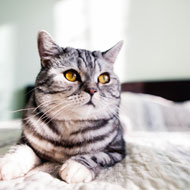Indoor cat study to look at joint disease

"... participants will help us to identify the earliest signs of joint disease.”
Bristol vets are seeking indoor cats to take part in a new study, looking at the impact of joint disease on activity levels.
Researchers from Bristol Veterinary School are planning to use activity monitors to measure the activity of cats with and without mobility problems, to improve understanding of joint disease.
Dr Emily Blackwell said: “By taking part in the study participants will help us to identify the earliest signs of joint disease which could make a difference to the lives of millions of cats in the future.”
The Feline Activity Study is part of ‘Bristol Cats’, a longitudinal project that launched in 2010. It follows the lives of over 2,000 cats to advance scientists’ understanding of common behaviour problems and diseases.
Cats participating in the activity study must be happy to meet and be stroked by strangers. They should be over six years of age, kept indoors and live within one or two hours’ drive from Bristol. They should not be on any pain medication.
The owners of the cats (aged 18 or over) will be required to complete two 15-minute questionnaires. Researchers will visit the cat at home and carry out a gentle examination of its joints. The animal will need to wear a breakaway collar with a light activity monitor attached for two weeks.
For more information view the Facebook page or contact Evelyn Maniaki on cat-study@bristol.ac.uk



 The latest
The latest